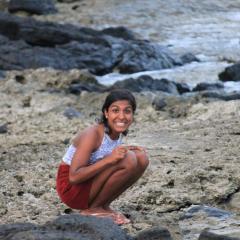My family moved around a bit before I was six years old – from Sri Lanka to Dubai to Japan – and while I don’t remember much about the cities and villages, I do remember the different coastlines. Some of my earliest and fondest memories are chasing crabs in Fukuoka and swimming away from triggerfish in Galle. Even after moving to Brisbane, I stayed a pretty marine-obsessed kid, drawing my friends pictures of whales and sharks whenever I could. It didn’t come as much of a surprise when younger-me would say that I wanted to be a marine biologist when I grew up.
The pull of coastal systems
Of course, there were a few crucial things I didn’t know when I naïvely said that as a kid: 1) I wouldn’t end up growing all that much (I’m very short); and 2) marine biology is not (always) about chasing crabs. By the time I enrolled at university, I knew I wanted to study science, but I was a bit hesitant about marine biology. I loved learning about the ocean and its organisms, but I couldn’t sail, I couldn’t dive, I couldn’t surf – and I was terrible at spotting critters, let alone identifying them. I was a little worried about being an imposter in my classes (a fake fan, if you will), and not having the applied understanding from my youth to make it in the profession. But as I went through my degree, I couldn’t help but continue to be drawn to coastal systems, and as I’m learning from all the different people in this area, there is more than one way to love and learn about these things.
For my Honours project, I studied tropical coral reefs in Palau. The stretches of reef I looked at had a drastic gradient over only 5km, from crystal clear waters full of incredible life to water that was chocolate brown from river runoff, with a thick layer of sediment smothering almost everything on the seafloor. The change was extreme, and I was honestly overwhelmed – pollution can be composed of a huge variety of things from different sources, each impacting coral differently depending on the species, depending on the life stage, depending on the exposure … Not even to mention how they can interact with each other! It was (and still is) too complicated for me to fathom, and I felt a bit hopeless.
After my Honours I had a short stint in consultancy working as an aquatic ecologist. I got to look at things from a much more people- and/or business-focused perspective, which was certainly different. Meeting the needs of clients, the law, communities and the environment made things even more complicated, but I found myself loving working with large groups of people with different expertise, all trying to solve a common problem.
Watershed moments
I’m now doing a PhD focusing on watersheds, looking at how we can manage them to improve runoff onto reefs downstream while also reducing water-related diseases in humans. The multidisciplinary nature of the project means I’m learning about lots of different areas (e.g., public health, conservation, water management) and working with lots of different people, which I couldn’t really have imagined as a kid thinking about this career.
I still can’t sail, but that’s okay! I am stoked that I get to learn about and hopefully help preserve the marine systems I’m interested in, and that I get to do it with such a great team.

